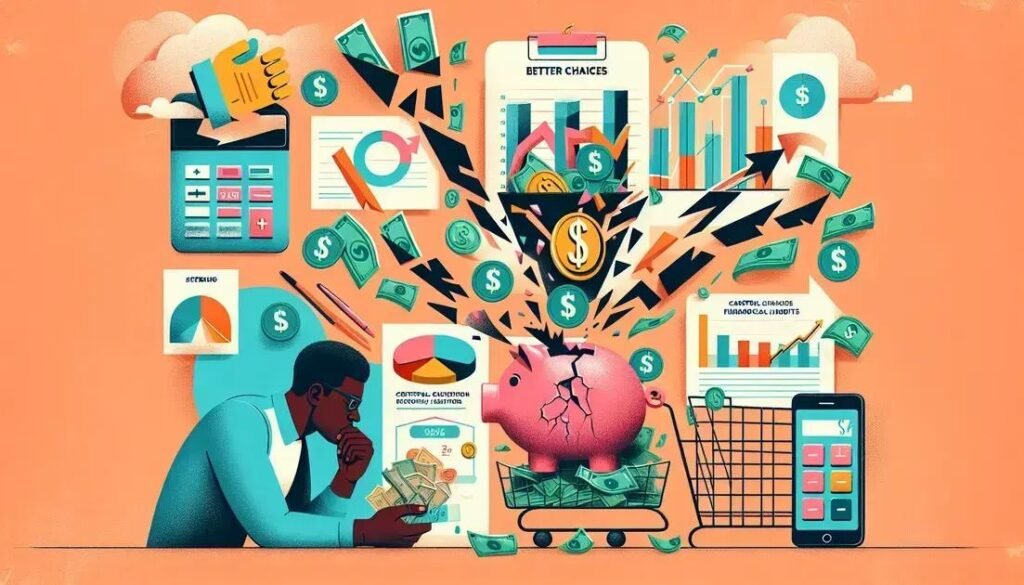Are you tired of living paycheck to paycheck? Do you find yourself constantly worrying about how you’ll pay your bills? The answer may lie in your spending habits.
By understanding where your money is going, you can take control of your finances and start building a brighter financial future.
In this article, we’ll explore the importance of developing healthy spending habits and provide you with the tools you need to make positive changes to your financial behavior.
Spending Habits: A Guide to Financial Freedom
Spending habits are a crucial aspect of personal finance, and understanding them is vital to achieving financial freedom. By tracking your expenses, you can identify areas where you can cut back and allocate your resources more effectively. This guide will walk you through the process of adopting healthy spending habits, helping you to break the cycle of debt and build a stable financial future.
The psychology of spending habits is complex and influenced by a range of factors, including social pressure, emotional state, and past experiences. Understanding why you make certain purchasing decisions can help you to develop more mindful spending habits and avoid impulsive buying. By recognizing the emotional triggers behind your spending, you can take control of your finances and make more informed choices.
Improving your spending habits doesn’t have to be complicated or time-consuming. Here are five simple steps you can take to get started:
-
Track your expenses to identify areas where you can cut back.
-
Set financial goals and prioritize your spending accordingly.
-
Avoid impulse buying by taking time to think before making a purchase.
-
Use cash instead of credit to reduce overspending.
-
Review and adjust your budget regularly to stay on track.
For many people, financial anxiety is closely tied to their spending habits. Fear of not having enough can lead to impulsive buying and debt, exacerbating the problem. By developing healthy spending habits and building an emergency fund, you can reduce your financial stress and achieve greater peace of mind.
Breaking the cycle of unhealthy spending habits requires a combination of self-awareness, discipline, and strategic planning. Identifying and challenging negative thought patterns can help you to resist temptation and make more informed choices. By developing a long-term perspective and prioritizing your financial goals, you can overcome the obstacles that stand in your way.
Budgeting and spending habits are inextricably linked. A well-crafted budget can help you to allocate your resources more effectively, make the most of your money, and achieve your financial goals. By prioritizing your spending and avoiding unnecessary expenses, you can build a stable financial foundation and create a brighter future.
The Psychology of Spending Habits
The psychology of spending habits is a complex and multifaceted phenomenon, influenced by a range of factors including personal values, emotional state, and social pressures. Understanding these underlying factors can help individuals develop more mindful and intentional spending habits, reducing the likelihood of financial stress and anxiety. By recognizing the emotional triggers behind their spending, individuals can take control of their finances and make more informed choices.
For example, research has shown that individuals who prioritize emotional well-being tend to make more thoughtful and deliberate purchasing decisions. Similarly, those who practice gratitude and self-reflection are less likely to engage in impulsive buying. By cultivating these habits, individuals can develop a more positive and balanced relationship with money.
5 Simple Steps to Improve Your Spending Habits
Improving your spending habits doesn’t have to be overwhelming or time-consuming. By following these 5 simple steps, you can start making positive changes to your financial behavior and achieve greater financial freedom:
-
Track your expenses to get a clear picture of where your money is going.
-
Set financial goals and prioritize your spending accordingly.
-
Avoid impulse buying by taking time to think before making a purchase.
-
Use cash instead of credit to reduce overspending.
-
Review and adjust your budget regularly to stay on track.
Spending Habits and Financial Anxiety
For many people, financial anxiety is closely tied to their spending habits. When we feel uncertain or insecure about our financial situation, we may turn to spending as a way to cope with these emotions. However, this coping mechanism can actually exacerbate the problem, leading to debt, financial stress, and anxiety.
To break this cycle, it’s essential to develop a healthier relationship with money and address the underlying emotional triggers behind our spending habits.
One effective approach is to practice mindfulness and self-awareness, recognizing when we are reaching for spending as a way to cope with emotions. By acknowledging and accepting our emotions, we can begin to develop more intentional and thoughtful spending habits.
Additionally, seeking support from friends, family, or a financial advisor can help us feel more grounded and secure in our financial decisions.
Breaking the Cycle of Unhealthy Spending Habits
Breaking the cycle of unhealthy spending habits requires a combination of self-awareness, discipline, and strategic planning. One effective approach is to identify and challenge negative thought patterns, such as the desire for instant gratification or the fear of missing out. By reframing these thoughts and focusing on long-term goals, individuals can make more intentional and sustainable financial decisions.
Another key strategy is to develop a growth mindset, recognizing that financial knowledge and skills can be learned and improved over time. By embracing this mindset, individuals can overcome the obstacles that stand in their way and achieve greater financial freedom.
Additionally, seeking support from friends, family, or a financial advisor can help individuals stay accountable and motivated on their journey to financial wellness. By combining these strategies with a comprehensive understanding of their spending habits, individuals can break the cycle of unhealthy spending habits and achieve greater financial freedom.
The Power of Budgeting and Spending Habits
Budgeting and spending habits are inextricably linked, and developing a comprehensive budgeting strategy can have a profound impact on one’s financial well-being. By prioritizing needs over wants and allocating resources effectively, individuals can build a stable financial foundation and achieve their goals.
A well-crafted budget can also serve as a powerful tool for reducing financial stress and anxiety, providing a sense of security and peace of mind.
Moreover, budgeting and spending habits can have a profound impact on one’s overall well-being, influencing factors such as mental health, relationships, and personal growth. By developing healthy habits and prioritizing financial well-being, individuals can create a brighter and more fulfilling future.
Frequently Asked Questions about Artificial Intelligence for Small Businesses
How can task automation benefit my small business?
Task automation frees up your team from repetitive tasks, increasing productivity and allowing them to focus on more strategic tasks.
What tools can I use for data analysis?
There are various tools available, such as Google Analytics, Tableau, and Microsoft Power BI, that help collect and interpret valuable data.
What are chatbots and how do they improve customer service?
Chatbots are virtual assistants that can answer questions and resolve problems at any time, improving the customer experience and freeing up your team.
How can I personalize the customer experience?
Through data analysis, you can better understand customer preferences and offer personalized recommendations and promotions.
Why is customer feedback important?
Feedback is essential to identify areas that need improvement and adjust your service strategy, ensuring customer satisfaction.
Is artificial intelligence accessible for small businesses?
Yes, there are various AI solutions that are accessible and scalable for small businesses to improve efficiency and customer service.




